
Matthew 4:13 is the thirteenth verse of the fourth chapter of the Gospel of Matthew in the New Testament. In the previous verse Jesus returned to Galilee after hearing of the arrest of John the Baptist. In this verse he leaves from Nazareth to Capernaum.

Matthew 5:31 is the thirty-first verse of the fifth chapter of the Gospel of Matthew in the New Testament and is part of the Sermon on the Mount. This verse opens the brief, but much scrutinized, discussion of the issue of divorce.

Matthew 27:3 is the third verse of the twenty-seventh chapter of the Gospel of Matthew in the New Testament. This verse returns to the story of Judas Iscariot who, in the previous chapter, had accepted payment to betray Jesus to the Jewish authorities. This verse opens the story of his remorse and death.

Matthew 28:1 is the first verse of the twenty-eighth chapter of the Gospel of Matthew in the New Testament. This verse opens the resurrection narrative as Mary Magdalene and "the other Mary" visit Jesus' tomb after the crucifixion.

Matthew 28:3 is the third verse of the twenty-eighth chapter of the Gospel of Matthew in the New Testament. This verse is part of the resurrection narrative and describes the angel who arrived at the tomb of Jesus in the previous verse.

Matthew 28:5–6 are the fifth and sixth verses of the twenty-eighth chapter of the Gospel of Matthew in the New Testament of the Christian Bible. Both verses form part of the resurrection narrative. An angel has appeared at the empty tomb and now gives instructions to Mary Magdalene and "the other Mary".
Matthew 28:12 is the twelfth verse of the twenty-eighth chapter of the Gospel of Matthew in the New Testament. This verse is part of the resurrection narrative. In this verse the guards of the tomb, after being present for an angel hearkening the resurrection, are bribed by the priests to lie about what they saw.

Matthew 27:63 is the sixty-third verse of the twenty-seventh chapter of the Gospel of Matthew in the New Testament. This verse occurs after the crucifixion and entombment of Jesus. In it the chief priests and the Pharisees are meeting with Pontius Pilate.
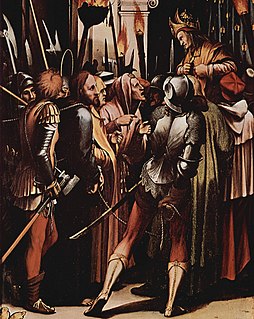
Matthew 27:62 is the sixty-second verse of the twenty-seventh chapter of the Gospel of Matthew in the New Testament. This verse occurs after the crucifixion and entombment of Jesus. In it the leaders of the Jewish community meet with Pontius Pilate.

Matthew 27:61 is the sixty-first verse of the twenty-seventh chapter of the Gospel of Matthew in the New Testament. This verse describes two women waiting by the Tomb of Jesus after the crucifixion.
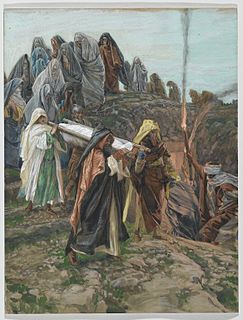
Matthew 27:60 is the sixtieth verse of the twenty-seventh chapter of the Gospel of Matthew in the New Testament. This verse describes the Entombment of Jesus by Joseph of Arimathea after the crucifixion.
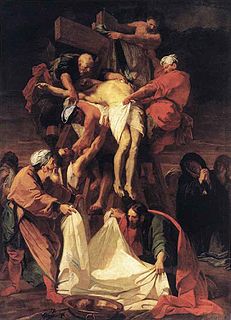
Matthew 27:59 is the fifty-ninth verse of the twenty-seventh chapter of the Gospel of Matthew in the New Testament. This verse describes Joseph of Arimathea gathering Jesus' body after the crucifixion.
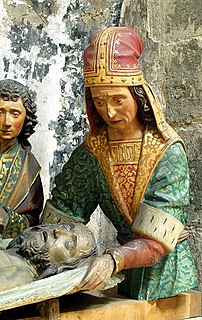
Matthew 27:57 is the fifty-seventh verse of the twenty-seventh chapter of the Gospel of Matthew in the New Testament. This verse begins a discussion of the burial of Jesus and introduces Joseph of Arimathea.
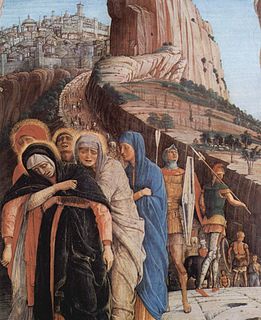
Matthew 27:55-56 are the fifty-sixth and fifty-seventh verses of the twenty-seventh chapter of the Gospel of Matthew in the New Testament. The crucifixion and death of Jesus have just occurred, and these verses make note of a group of women who were present at that event.

Matthew 10:1 is the first verse of the tenth chapter of the Gospel of Matthew in the New Testament. In this verse Jesus gathers his disciples and grants them healing powers in what is known as the commissioning the twelve apostles.

Matthew 8:5 is the fifth verse of the eighth chapter of the Gospel of Matthew in the New Testament. This verse begins the miracle story in which a centurion's servant is healed, the second of a series of miracles reported in Matthew.

Matthew 27:11 is the eleventh verse of the twenty-seventh chapter of the Gospel of Matthew in the New Testament. This verse brings the narrative back to Pilate's Court, and the final trial of Jesus.
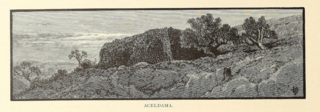
Matthew 27:7 is the seventh verse of the twenty-seventh chapter of the Gospel of Matthew in the New Testament. This verse continues the final story of Judas Iscariot. In the previous verses Judas has killed himself, but not before casting the thirty pieces of silver into the Temple. In this verse the priests decide to buy a potter's field with them.
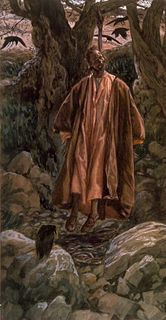
Matthew 27:5 is the fifth verse of the twenty-seventh chapter of the Gospel of Matthew in the New Testament. This verse continues the final story of Judas Iscariot. In the earlier verse Judas had regretted his decision to betray Jesus, but is met with disinterest from the Jewish leaders. In this verse his response is to return the blood money and then commit suicide.

Matthew 27:2 is the second verse of the twenty-seventh chapter of the twenty-seventh chapter of the Gospel of Matthew in the New Testament. Jesus has just seen condemned by the Jewish Sanhedrin, and in this verse is presented to Pontius Pilate.



















